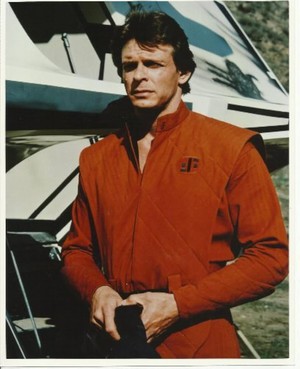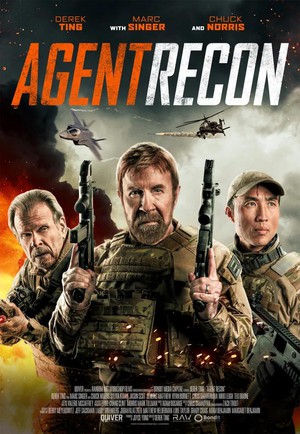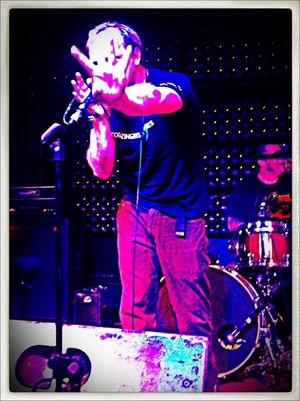I get a lot of emails. A lot of invites to screen films, read books, watch documentaries, talk to strangers. A lot. I can’t answer them all, sadly. But when I got an email that said there was a new film coming out with Chuck Norris and Marc Singer, and would I like to talk to Marc Singer about it, I practically broke the sound barrier with my swift response of “hell to the yes!”
I’m a man of a certain age, and I grew up in the wilds of Southeast Texas. As I recall my rough and tumble childhood, I don’t say I’m from the streets - I’m from the roads. Concrete jungle films didn’t interest me quite as much as actual jungle films, so if you wanted my ticket money, throw an animal or two in your film. Want to see Clint Eastwood act with a monkey? Hell yes, take my money.
So for me there was no greater action franchise than the BEASTMASTER films starring Marc Singer. The Sword & Sorcery world of Conan distilled through the eyes and wings of beasts and marketed to a younger audience, it surprised me to learn that the films came out in the same year and were envisioned in relative ignorance of one another. While CONAN THE BARBARIAN was the box office victor, and probably stands the test of the time more defiantly, I take some pleasure in knowing that it made four times the box office draw of BEASTMASTER at the cost of four times the latter’s production budget.
While BEASTMASTER made me a Marc Singer fan, his involvement made me a ‘V’ fan. The landmark television miniseries left an indelible mark on my interests for years to follow, and I still get excited to talk about it with anyone who’ll listen to this day. (As I did when I talked to Morena Baccarin about an unrelated project.)
So I watched AGENT RECON, unaware that it is actually the third film in a series, all of which are written, directed, and starring Derek Ting. I wish I’d known this because I started the film and walked into the kitchen to pour a drink, listening to the narration of Ting’s character Jim telling us about an alien presence and an “ash” that changes human physiology and psychology, prompting me to return to the room, stop the film, and ensure that I’d clicked the right feature to play. I didn’t expect a film with Chuck Norris and Marc Singer in camouflage military fatigues to involve aliens, but, hey, it does.
What transpires is much what you’d imagine from a relatively unknown action writer/director/star. Ting is something of a dying breed, or hopefully a harbinger of a resurgence of this stalwart 80s trope. My youth is stamped by vanity projects from action stars steering the ship, and while I struggle to think of a good example, I still continue to appreciate the effort. For bad examples, look no further than SUPERMAN IV: THE QUEST FOR PEACE, THE MUMMY (2017), or MAXIMUM IMPACT (which I shamelessly enjoyed but can’t say is “good”).
AGENT RECON sees Ting’s Jim Yung caught up in a military dragnet investigating the spread of the Ash and its effects on humankind, as well as the consciousness of his mentor Alistair (the pronunciation of whose name is more mercurial than the weather in Texas) implanted into a cyborg that looks and sounds an awful lot like a bemused Chuck Norris. The military unit, led by the perpetually angry Colonel Green, portrayed by Singer, and manned by a pair of hotheads, is off to do reconnaissance (see, there it is) at a base conducting experiments that has gone silent. Yung is tacked on to the team and the film is underway, action on the horizon.
I wanted to like this film, and there are aspects that I genuinely did. Marc Singer is acting his ass off, and I noted while transcribing our conversation that he might’ve offered some of the most poignant observations of the craft as any to whom I’ve spoken. Chuck Norris is used sparingly but respectfully, and I found myself thankful that his hand wasn’t overplayed. Derek Ting has the potential to be a breakout action star, and I’m glad his name is on my radar. The film certainly sets up a sequel, and as I’m led to believe these films get more ambitious as they continue, I might even check that out.
The parts that don’t work in the film are the direction and juggling of multiple setpieces. When all the action and players converge, it works, but when the focus is split there is a clear ineptitude in either the camera or editing department. That’s to say, when some of the principles are monitoring the mission at a separate site the camera lingers on actors standing with little to do, so to the point that I thought we were being directed to believe there might be a mole among them. As the film rolled forward I realized that wasn’t the case at all - it was merely a camera lingering where it didn’t belong on actors that didn’t know what to do with their faces. It was a feature-length side eye akin to the throw away glance from the hacking scene in SOUTH PARK: BIGGER, LONGER, & UNCUT.
That said, the film is admirable in its ambition and I was genuinely impressed with the range displayed by Marc Singer, whom I was able to speak with early last week and thank personally for his role in this and several formative films from my lifetime.

Eric McClanahan - So we’re talking about AGENT RECON which you did with Derek Ting, who wrote, directed, and starred in the film. Tell me about working with Derek.
Marc Singer - Well, he’s a triple threat, isn’t he? I mean it’s an amazing thing when you think about how hard it is to organize just the crew members, alone, on an action-adventure movie like AGENT RECON. There’s pyrotechnics, there’s gunplay, there are the back, off-camera crew, of which we had a sufficiency, believe me. There are all the sets out in the wilderness where we filmed, they were the classic Hollywood movie towns that make you believe you’re in a faraway land, that we’re traveling in and among the alleyways of. Then there’s the story itself that he created, the directing of it, seeing to all the details of it and starring in it. That’s a hefty role for one man, but I think that’s one of the things that gives the movie a real authenticity, is the intensity of the energy that goes into the actual creation of it. You can see it on the faces of the cast as we go through the muddy rains and the dry hot spells. You know, it’s a good movie - it’s got a great bit of grit to it but at the same time there’s the human side of the story, which is a relationship between a father and a daughter who have chosen the same profession in the midst of an apocalyptic chaos. It’s a great movie. I have to hand it Derek and to the crew and to the rest of the cast that put their efforts into this and did it so mightily and it came off so well.
EM - Yeah, you are very much the emotional heart of the film because of the story of your character and that father/daughter relationship you referred to. Did you feel any enormous pressure in carrying the emotional weight of this film on your shoulders alone?
MS - I’d be lying if I didn’t say that was the case. It is. There’s always a lot of personal experience that surfaces in the making of a film and a father/daughter relationship, or probably in a father/anybody relationship. But I found it to be very moving, very poignant in the way the script develops that because we catch a glimpse of them trying to work out the differences and the similarities and find a balance between the generations. That’s always difficult, it doesn’t matter in what time or space, and having the responsibility of that as far as the script is concerned, you have to harness all of your inner emotions and confine them and drive them along the corridor that the script confines you to. So, yeah, it was a mighty endeavor but we all survived and, thankfully with the rest of the cast to support that theme, a lot of that burden was lifted from me.
EM - Yeah, you had to keep a lot of cards close to the vest as the film was playing out, so it was a Herculean effort, which I appreciate, on your part. So thank you.
MS - I appreciate you for saying so. It’s one of the aspects of acting, which is that in our daily lives, when we’re just us being us, you and me and anybody else, those factors which are complex in our makeup, we have little occasion to refer to in the common way of interchange with people. But on the screen, or on the stage, those are the very things that you want to bring forth and expose, and that in itself, trying to find the key to unlock those doors, is a challenging part of the process.
EM - So you have a long and storied career. You’ve done a lot of work and particularly a lot of action. In this film, you’re clearing a town with your team, so was there any team building or brush up of military protocol to prepare you for those scenes?
MS - Well, yes and no. There was a definite set of yeses and nos, boxes that you had to check in the way you behaved as part of a military unit. But on the other hand, unfortunately, there are enough examples in the world today of how such things are carried on and the protocols and mannerisms of fighting forces that that kind of information is generally available in one form or another. Whenever you are preparing for a role there is preproduction research that is required by every performer that steps in front of the camera.

EM - Right, like action choreography and the like?
MS - Well, that sort of stuff, that you have to rely upon the experts on the set on the scene for. There’s weaponry that, no matter your familiarity with it on sight, whether from news reports or information on the web, something like that, nonetheless, holding that actual article in your hand is a completely different experience. There’s a whole facility that you have to achieve very quickly with the mechanisms of its workings and things like that in order to handle it correctly and make sure you’re not the only one looking like a geek and wrestling the rest of the class who's doing things correctly. So, yeah, there is a learning curve to it, no question.
EM - Speaking as a fan of your work, I loved the BEASTMASTER series and I loved ‘V’ and I was so grateful that you appeared in the revival of ‘V’. If there were a revival of the BEASTMASTER series would you make a cameo and do you believe that the Sword & Sorcery genre could make a comeback?
MS - I do. I don’t believe there’s any genre that couldn’t have a revival. Westerns, for example, the old cowboy epics went through a period of great romanticism back in the 1950s, 60s, and maybe on into the 70s, but then things began to change and they became, uh, the term is escaping right now, but they became more realistic and they were populated with more antiheroes of a grubbier type and a more questionable ethic. But it’s the same basic story - it’s cowboys and cowgirls out on horses out in the old west. So Sword & Sorcery certainly has a future to it. I’m surprised, having participated in one of its revivals which was filmed down in Australia, when I played a continuing role in that for a while and directed, how difficult it is to conduct a believable Sword & Sorcery script. They’re a lot more particular and consequently a lot more demanding in how you put them together believably and how you film them in a way that imbues the atmosphere with the hypnotics that makes the audience believe the time and place. It’s a complex thing, and it’s very grueling, physically, as a matter of fact. They’re the toughest kind of films for the actors, physically.
EM- Well then that’s even more reason for me to say Thank you so much for your contribution to that genre and, again, that series is dear to my heart. It does look like we are out of time but thank you so much for talking to me today about AGENT RECON!
MS - Thank you, Eric, so much. I appreciate the chance and the invitation. It was nice to meet you.
AGENT RECON is streaming now wherever you get your action movies!
Until next time, take care!
-McEric, aka Eric McClanahan-
